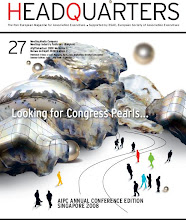 I have the advantage of not living far from Brussels. That gives me the opportunity to have a chat once in a while with an association executive at the headquarters of some international association. And there are some of those in Brussels, as you all know. Every two months I send 1800 HeadQuarters magazines to those people. One of those people with whom I exchange ideas on a regular basis, is Luc Hendrickx, Executive Director of the International Diabetes Federation. The last conversation we had was about bid books. ‘I hate traditional bid books that look like glossy tourist brochures,' he told me. 'Those get thrown in the waste paper basket right away. To me the ideal bid book is as large as an A4 size, or rather a one-page fact sheet on each venue that we are happy with if the board will select it.' Luc also has his own thoughts on local hotshot ambassadors. Oops, I'll stop telling and I'll prepare a text about Bid Books Nowadays! And about Ambassadors of the good old days.
I have the advantage of not living far from Brussels. That gives me the opportunity to have a chat once in a while with an association executive at the headquarters of some international association. And there are some of those in Brussels, as you all know. Every two months I send 1800 HeadQuarters magazines to those people. One of those people with whom I exchange ideas on a regular basis, is Luc Hendrickx, Executive Director of the International Diabetes Federation. The last conversation we had was about bid books. ‘I hate traditional bid books that look like glossy tourist brochures,' he told me. 'Those get thrown in the waste paper basket right away. To me the ideal bid book is as large as an A4 size, or rather a one-page fact sheet on each venue that we are happy with if the board will select it.' Luc also has his own thoughts on local hotshot ambassadors. Oops, I'll stop telling and I'll prepare a text about Bid Books Nowadays! And about Ambassadors of the good old days.As a bonus Luc sent me the title of a good book, because, as it happens, we had also been talking about the art of 'presenting things the good way': Beyond Bullet Points – Microsoft Press, Washington, 2005- ISBN-13 978-0-7356-2052-0






1 comment:
Thanks for touching on the issue of bid books in your blog.
Associations owe it to themselves to try in every possible way to take the best decision about where to take their next congress. It probably doesn't hurt that this decision is made on a few facts and figures, and using objective criteria as much as possible, rather than gut feeling, emotion, or worse still, prejudice. Going only by glossy bid books or having the decision depend on the presentation skills of the local professor or the charm of the venue representative does not usually help to focus the venue selection committee on the task at hand.
In our organization, we do not discart bid books. They are very useful backgrounders containing essential technical information. We explicitly ask for these technical data and other venue commitments. They do disappear into the bin. Only, the full bid book does not get circulated to each individual committee member. The office extracts the relevant and essential technical information from them to present to the selection committee in a summarized, uniformly formatted way, literally on one side of an A4 per venue, complemented with verbal comments during the meeting.
Objectivizing the decision for the next open congress date obviously becomes more important as the congress grows in size. If the event is 2000 participants, and the committee takes the wrong because emotional decision, the meeting planner, with some tweaking, can probably cope with the less than perfect venue. But when the congress is 10,000+, one day the mess from a committee choosing an inappropriate venue is bound to land on somebody's desk. I don't want it to be mine.
After all, long-term planning does not deal with future decisions, but with the future of present decisions.
Luc Hendrickx
Post a Comment